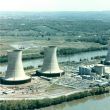Closing the fuel cycle: Majority viewpoint
By Baldev Raj, P.R.Vasudeva Rao, May 18, 2015
Klaus Janberg and Hui Zhang have not contested the central argument that we have advanced in favor of reprocessing and breeder reactors: that today's generation bears an obligation to future generations not to deplete the world's uranium resources. Instead, Janberg and Zhang have focused on economic questions, waste issues, and also on India's nuclear weapons program—which comes out of context, as this roundtable's purpose is to discuss a subject, not any nation's position on that subject.
In Zhang's Round Two essay, we also identify several technical inaccuracies. For example, Zhang argues that "high-level waste, long-lived intermediate waste, and low-level waste [from plutonium reprocessing and recycling] … must eventually be buried, so reprocessing does not eliminate the need for repositories." This is far from accurate. The fact is that only high-level waste requires burial in deep geological repositories. Intermediate waste can be buried in shallower repositories—which are easier to establish. And low-level waste can be diluted and dispersed, with no need for repositories at all. Indeed, this represents the international approach to waste management (not merely India’s).
Zhang also suggests that the once-through cycle requires no more space in geological repositories than the closed fuel cycle demands—as long as waste is stored for 100 years in dry casks. Again, this is far from correct. Numerous papers in the literature clearly illustrate that, via the once-through fuel cycle, the toxicity of high-level waste is reduced to levels equivalent to that of natural uranium only after tens of thousands of years. But when transuranics are removed through reprocessing, toxicity levels equivalent to that of natural uranium are achieved after just 300 years. This is a fundamental truth based on the nature of radioactive decay. It cannot be wished away. In any event, Zhang and Janberg's emphasis on dry cask storage is misguided. Is there any way to guarantee the safety of spent fuel stored in casks for hundreds or thousands of years? As we wrote in Round Two, the safest place for plutonium is inside a reactor. Dry casks can't compare.
Now or later. Another important advantage of reprocessing, to which Zhang and Janberg have given no attention, is its ability to reduce the need for uranium mining. Of all the stages in the nuclear fuel cycle, including ultimate waste management, mining is responsible for delivering the highest doses of radioactivity to human populations. The 2015 International Congress on Advances in Nuclear Power Plants, recently conducted in Nice, France, included presentations and discussions about nuclear systems powered by depleted uranium and plutonium (derived through reprocessing) and their potential to reduce the need for mining uranium, if not obviate it completely.
Zhang wrote in Round Two that "breeder reactors and plutonium recycling still have far to go before they can meaningfully contribute" to the establishment of sustainable nuclear power. We are pleased to see that Zhang believes breeders and reprocessing might meaningfully contribute at some point, even if the time isn't now. But that, actually, is the focus of our argument—that the wide-scale adoption of breeder reactors and plutonium processing is a question of when, not whether. The global need to achieve energy sustainability has decided the "whether." The "when" depends on individual nations' policies, technological maturity, and energy requirements.
To our knowledge, no nation has ever taken the view that the closed fuel cycle will never be required. In fact, only a very few countries favor the once-through cycle, and some of these nations intend to phase out nuclear power entirely. The balance of nations hold the view that the closed fuel cycle is not now economical in their countries, or is not now required. But they reserve the option to adopt the closed fuel cycle in the long run. The importance of fast reactors and plutonium reprocessing has often been acknowledged in international programs such as the International Congress on Advances in Nuclear Power Plants and the Generation IV International Forum. The reasoning behind this majority position is that if nuclear power is to be sustainable—where the parameters of sustainability include economics, safety, and waste management—the closed fuel cycle and fast reactors are indispensable.
Topics: Nuclear Energy, Nuclear Weapons
Share: [addthis tool="addthis_inline_share_toolbox"]














